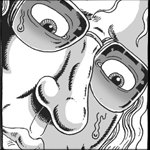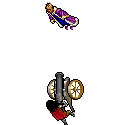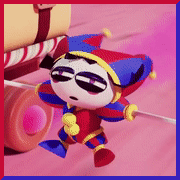|
throw it in the chute
|
|
|
|

|
| # ? May 26, 2024 16:34 |
|
RODNEY THE RACEHOR posted:throw it in the chute Wouldn't fit, mate.
|
|
|
|
LET’S READ THE KINGKILLER CHRONICLE CRITICALLY Part 26: “’Nothing pleasant,’ she said, avoiding my eyes. ‘But nothing unexpected either.’” Slight warning: my criticisms are probably going to just get more and more repetitive. It’s a new term in Chapter 62, “Leaves”, and Kvothe is managing his workload better. His best bet for making money now is artificing, which is making magical items if you forgot. One day Master Kilvin is displaying the students a load of bone-tar, a dangerous substance he has procured. When Kvothe returns to the inn he finds Denna and... Yeah, it’s happening again. These two plotlines actually converge, but the pacing and structuring is still ridiculous. There’s no thematic or aesthetic continuity between them beside the droning narration. And the action is limited to dull conversations: Kvothe talks to Manet while Kilvin provides exposition, then he talks to Denna, then he talks to Wilem and Simmon, then he talks to Kilvin, then he talks to Manet again, then he goes back to talk to Kilvin, then Wil and Simon again, then Denna again, then Deoch... Again, this format of a chapter-by-chapter review meets its limit when faced with the sheer drudgery of Chapters 60-68. Since I’m not as masochistic as Ronan Wills, I’m just going to provide high-lights of each chapter and provide my thoughts at the end. That is how lacking these chapters are. There’s an anachronistic scene of a volatile liquid arriving at the Artificery: quote:
Kvothe talks with Denna, and is supposed to be a teenager: quote:“You remind me of a willow.” She said easily. “Strong, deep-rooted, and hidden. You move easily when the storm comes, but never farther than you wish.” Chapter 63, “Walking and Talking”, is nothing but Kvothe talking with his two interchangeable friends about walking and talking with Denna: quote:I began to bristle. “I don’t ramble. We just walked,” I said. “Talked.” Chapter 64, “Nine in the Fire”, Kvothe has made a magic lamp as an apprentice work, and is showing it to Kilvin. He doesn’t like it since it’s a thieves’ tool, but Kvothe’s work is still exceptional: quote:“Do not grovel,” he said. “False modesty does not impress me.” There is some progression. Kvothe surmises from his elderly friend that there’s a hidden entrance to the Archives, and now he has a lamp which he can use to explore at night. In Chapter 65, “Spark”, Kvothe talks to his interchangeable friends, Denna, and Deoch, in that order. Kvothe promises to meet Denna for lunchs. That is all the progression in the chapter. In Barry Lyndon, there are two chapters where the hero returns to Ireland to continue his wooing of Lady Lyndon. This involves reuniting with his family, ingratiating himself into the high society of Dublin, running a sword through Lady Lyndon’s suitor, then presenting Lady Lyndon’s old love letters to turn said suitor against her, and personally terrorizing Lady Lyndon. It’s a much better romance because there is action to it. Like I’ve said, Kvothe's and Denna's romance isn't bad in principle, there is simply too much time spent on it when it explicitly goes nowhere: quote:I spoke subtle circles around the way I felt, not wanting to be overbold. I thought she might be doing the same, but I could never be sure. It was like we were doing one of those elaborate Modegan court dances, where the partners stand scant inches apart, but—if they are skilled—never touch. And remember, this is intertwined with all that stuff about volatile chemical, apprenticeship, etc. The dialogue between them in these chapters could be cut entirely without any loss. There is no weight or depth to them. This is why readers bristle at the mention of Denna: she represents denied expectations as both theme and as wasted paper. In Chapter 66, “Volatile”, Kvothe is working at the Artificery when the bone-tar causes a fire to break out and for dear old Anton Pavlovich to lurch in his place of repose. The whole chapter is remarkable in how utterly dull Rothfuss’s prose makes it. The sequence is appended by minutiae that rob it of any power: quote:“Should there be this much frost?” I asked him, pointing out the tar canister. Its edges were covered in fine white tufts of frost, like tiny shrubs. The air around the metal actually shimmered with cold. quote:Fela hadn’t screamed or called for help, which meant no one but me had noticed the danger she was in. If Kilvin’s demonstration was any indication, I guessed the whole shop could be a sea of flame and caustic fog in less than a minute. There wasn’t any time…. Kvothe valiantly rescues Fela with some quick thinking. Unfortunately he falls unconscious and misses his lunch with Denna. He’s also lost a shirt and his only pair of shoes. On the other hand, people are spreading stories of the incident and Kvothe is now considered a hero. It took five chapters to accomplish all of this. Granted, they tend to be short, but this once again shows the books’ poor pacing and structuring. All the nonsense with Denna and magic items can be told in one chapter each. Instead Rothfuss misguidedly attempts to liven them up by intertwining them. Thackeray has all the happenstance during Barry Lyndon’s return to Ireland tie into his rough wooing of Lady Lyndon. That is competent storytelling. These five chapters are also exemplary in that they are very good examples of the narrowness of imagination that plagues Kingkiller. Or perhaps not so much plague as define. Why is it that the most fantastical thing featured in these five chapters of this fantasy epic are lamps that grow very bright and a chemical fire in a college laboratory? This again goes back to the great irony that the book is less fantastical and outlandish than most “realist” novels I’ve read. There’s a dialogue in Crime and Punishment where a man recalls seeing a ghost of a woman he might or might not have murdered. That’s about more substantially imaginative than anything that happens in Kingkiller, because the fantastical in the series never indicates a deeper meaning or a greater purpose. You might wonder why I still bother with this, but it’s all in order to free this thread of the curse of Kingkiller. quote:Deoch gave me a sympathetic grimace. “She asked about you,” he said consolingly. “And waited for a good long while too, almost an hour. Longest I’ve ever seen that one sit still.” ROTHFUSSIAN ANACHRONISMS quote:Jaxim peered at it, then shrugged. “Better too cold than not cold enough,” he said with a humorless chuckle. “Heh heh. Kaboom.” SHRUG quote:“I thought I’d play the dutiful mentor today,” he shrugged. quote:He absently ran his hands through his wild hair and shrugged. quote:Manet shrugged. quote:Sim grinned, shrugging it off. quote:He tapped his head for a moment, then shrugged. quote:I shrugged, buying a moment to think. I couldn’t tell her the truth. I knew every man must compliment her, bury her in flattery more cloying than roses. I took a subtler path. “One of the masters at the University once told me that there were seven words that would make a woman love you.” I made a deliberately casual shrug. “I was just wondering what they were.” quote:Sim shrugged off my comment. BravestOfTheLamps fucked around with this message at 13:06 on Jul 6, 2016 |
|
|
|
BravestOfTheLamps posted:
Don't worry, to anyone who's read the books more then once (or maybe 11 times) they can barely tell the difference.
|
|
|
|
I remember there being some general creepiness about Fela in the first book. Did that show up in this chapter or is it later on?
|
|
|
|
Grenrow posted:I remember there being some general creepiness about Fela in the first book. Did that show up in this chapter or is it later on? It's in literally every chapter Fela is in.
|
|
|
|
Well Kvothe just happens to save her twice, and she starts hitting on him (a fifteen year old boy). Also Ambrose harasses her, which leads to this: quote:Ambrose stiffened and his arm slid off the back of the chair to fall at his side. His expression was pure venom. “When you’re older, E’lir, you’ll understand that what a man and a woman do together—” Remember, Kvothe is supposed to be fifteen. BravestOfTheLamps fucked around with this message at 19:05 on Jun 5, 2016 |
|
|
|
BravestOfTheLamps posted:If you’re going to force yourself on a woman, have the decency to do it in an alleyway. At least that way she’ll feel justified screaming about it. Jesus christ. Yeah, this is the line I was thinking of. The only thing worse than this is the scene with Kvothe and actual rape victims from book 2.
|
|
|
|
I think there's another one where he winds up in her room or something too. But that could be literally any of the women since they're all written exactly the same with the exception of Devi, sort of.
|
|
|
|
Grenrow posted:Jesus christ. Yeah, this is the line I was thinking of. The only thing worse than this is the scene with Kvothe and actual rape victims from book 2. Its some truly excruciating writing you sort of miss in the moment as your reading because you're so used to Kvothe always dropping one liners but it sounds like something a neckbeard nerd would try to sputter out at a party when he gets into an argument with the cool dude. I honestly think all of these slick lines are things that Rothfuss had in his head as a comeback when he was getting taunted/disrespected in his life but never said out loud and thinks if he had said him the entire room would stand and clap. That Rothfuss would allegedly refuse to accept any criticism of his prose is pretty damning when this is what he puts out. It's like he lives in a bubble of internet/nerd culture and he honestly thinks sick burns are the height of literary genius. Solice Kirsk posted:I think there's another one where he winds up in her room or something too. But that could be literally any of the women since they're all written exactly the same with the exception of Devi, sort of. They're all nothing more then 1-dimensional set pieces to show off how great Kvothe is, either by having sex with him, being a blatantly wrong racist, or someone who teaches him something then is blown away that he mastered it better then they did.
|
|
|
|
Eh, the one girl masters the name of stone before him. And Devi beats him at sympathy. Other than those two things though you're absolutely right.
|
|
|
|
pentyne posted:Its some truly excruciating writing you sort of miss in the moment as your reading because you're so used to Kvothe always dropping one liners but it sounds like something a neckbeard nerd would try to sputter out at a party when he gets into an argument with the cool dude. I honestly think all of these slick lines are things that Rothfuss had in his head as a comeback when he was getting taunted/disrespected in his life but never said out loud and thinks if he had said him the entire room would stand and clap. True, but hopefully, by the end of this, you will be free of your hatred. That is my sincere wish.
|
|
|
|
I have disagreed with a majority of things posted re: part 26 (including part 26 itself). I will concede that the Bone-Tar is a pretty clumsy pavlov's gun, but honestly I don't often see one that isn't clumsy to some extent. The one point I want to pick out in particular is: quote:Why is it that the most fantastical thing featured in these five chapters of this fantasy epic are lamps that grow very bright and a chemical fire in a college laboratory? This again goes back to the great irony that the book is less fantastical and outlandish than most “realist” novels I’ve read. There’s a dialogue in Crime and Punishment where a man recalls seeing a ghost of a woman he might or might not have murdered. That’s about more substantially imaginative than anything that happens in Kingkiller, because the fantastical in the series never indicates a deeper meaning or a greater purpose. This is a point you've touched on a number of times, and I've always found it to be a strength rather than a problem. The world is a fantasy world that none of its inhabitants really think is a fantasy world - Kvothe is the only one that's really peered 'behind the curtain' at all. The storytelling makes even the actual magic (sympathy) into an empirical thing to enforce a feeling of mundane-ness on the world. This sets up not only a huge contrast with Naming (as the more 'conventional' feeling magic), but also a core conflict for Kvothe, who needs to do research on something that the rest of his peers genuinely think is a children's storybook monster.
|
|
|
|
|
The magic isn't boring because of how the characters approach it, it's boring in itself. It rarely reflect any interesting idea, theme, or aesthetic, and is always expressed through slack prose. The chemical fire isn't dull because it's supposed to be mundane, it's expressed in a very boring manner. It's just a chemical fire. Here is how three fantasy authors describe fire, the very substance of energy and destruction: Mervyn Peake: quote:Fuchsia's hands came across the heavy object almost at once, and as they did so the room was lit up with a tongue of flame that sprang into the air among the books on the right of the unused door. It died almost at once, withdrawing itself like the tongue of an adder, but a moment later it shot forth again and climbed in a crimson spiral, curling from left to right as it licked its way across the gilded and studded spines of Sepulchrave's volumes. This time it did not die away, but gripped the leather with its myriad flickering tentacles while the names of the books shone out in ephemeral glory. They were never forgotten by Fuchsia, those first few vivid titles that seemed to be advertising their own deaths. Joe Abercrombie: quote:Another surge of flame went up, people stumbled away, shoving madly, a ripple through the straining crowd. They suddenly parted and the Incredible Ronco came thrashing straight at Shivers, white fire wreathing him like some devil burst out of hell. Shivers tottered back, smashed him away with his shield. Ronco reeled into the wall, bounced off it and into another, showering globs of liquid fire, folk scrambling away, steel stabbing about at random. The flames spread up the dry ivy, first a crackle, then a roar, leaped to the wooden wall, bathing the heaving courtyard in wild, flickering light. A window shattered. The locked gates clattered as men clutched at 'em, screaming to be let out. Shivers beat the flames on his shield against the wall. Ronco was rolling on the ground, still burning, making a thin screech like a boiling kettle, the flames casting a crazy glare across the bobbing masks of guests and entertainers—twisted monsters' faces, everywhere Shivers looked. Patrick Rothfuss: quote:Quick as I was, I wasn’t quick enough. There was a blinding crimson flare from the corner of the workshop as the fog began to catch fire, sending up strangely angular tongues of violent red flame. The fire would heat the rest of the tar, causing it to boil more quickly. This would make more fog, more fire, and more heat. BravestOfTheLamps fucked around with this message at 02:33 on Jan 16, 2017 |
|
|
|
The magic is also arguably boring because of how the characters approach it. The empiricism of magic as a thing in fantasy is rarely done well because you're taking one of the primary priming triggers of the genre -- the expectation of the fantastical and impossible as represented through the power to do impossible things -- and then going "but actually it's just kind of like chemistry or physics." Clarke's Law almost never works in the inverse case, because it removes wonder from the equation rather than adding it. One could do it, but then it would require some sort of thematic importance touching on the fact that the magical is mundane to people. Rothfuss tries to have it both ways by having some magical stuff that is known and understood and other stuff that is wild and unpredictable, but there's no particular reason why the people inhabiting his world should be dismissive of fairy tale stuff when naming exists. If pretty much all known magic were empirical then one could set up a major theme of the story about how legends are often true and some aspects of them can't be explained or categorized, setting up Kvothe as an agent of wonder in a world that has lost it and thus the only person capable of recognizing and confronting a threat posed by an enemy that lives in and thrives on the wondrous. That is decidedly not the theme as presented in the series, though, as Kvothe's entire thing is showing off how fantastical and legendary things he was involved in are not that big of a deal and have rational explanations. Which could also work as a theme, really, but again the author tries to have it both ways without properly explaining how the two aspects interplay. There are some examples I can think of where this is played with in a clever way. Jack Vance hit upon magical empiricism, but then twisted it around by having all of that done in the past and long forgotten such that magic is wondrous again and almost more bizarre and wonderful because it operates according to a rigid method that no one understands anymore. Gene Wolfe is constantly conflating magic, miracle, and hypertech in Book of the New Sun, and the explanation for everything doesn't fully explain the religious weight granted to so much of the things that happen. I'm sure there are more on-point examples of magical empiricism as a major theme in a positive or negative sense (e.g. "There is nothing that cannot be understood and explained in time, and this is a good thing" vs. "Attempting to understand the fundamentally incomprehensible is folly").
|
|
|
|
LET'S READ THE KINGKILLER CHRONICLE CRITICALLY Interlude - Jack Vance Describes Magic as a Science quote:Magic is a practical science, or, more properly, a craft, since emphasis is placed primarily upon utility, rather than basic understanding. - Jack Vance, Rhialto the Marvellous BravestOfTheLamps fucked around with this message at 08:23 on Oct 5, 2017 |
|
|
|
Nakar posted:Rothfuss tries to have it both ways by having some magical stuff that is known and understood and other stuff that is wild and unpredictable, but there's no particular reason why the people inhabiting his world should be dismissive of fairy tale stuff when naming exists. The muddled distinction between the ideas of "fantastic" and "mundane" that results from Rothfuss' messy writing also shows up when they run into the draccus later in the book. It's done in kind of a smug way, like "oh, you silly fools, you thought I fought a dragon when I only fought a dracchus, isn't that clever?" No, it's not. The distinction is facile. It's a reptile with four legs that breaths fire. Seems pretty much like a dragon to me. There's only a distinction between the two in order to be smug at the audience because, you see, folklore isn't always true! It's an incredibly banal, trite point delivered with maximum smugness.
|
|
|
|
Grenrow posted:The muddled distinction between the ideas of "fantastic" and "mundane" that results from Rothfuss' messy writing also shows up when they run into the draccus later in the book. It's done in kind of a smug way, like "oh, you silly fools, you thought I fought a dragon when I only fought a dracchus, isn't that clever?" No, it's not. The distinction is facile. It's a reptile with four legs that breaths fire. Seems pretty much like a dragon to me. There's only a distinction between the two in order to be smug at the audience because, you see, folklore isn't always true! It's an incredibly banal, trite point delivered with maximum smugness. Until the second book when it is all 100% true and delivered with maximum smugness.
|
|
|
|
Just read Rothfuss' "rewrite" of Esio Trot by Roald Dahl and every time I think if it I get blindingly angry. Was this discussed in thread at all?
|
|
|
|
quote:gently caress this book. Don't read it to your kids. That's the short version. I feel a published author should be able to give better criticism than "gently caress this book"
|
|
|
|
He does! "A nickel's worth of story in a dollar-long book". Now what does that remind me of... edit: Nevermind, that's about the other one. Still really funny. gently caress, the whole thing is a set of revelations: "(I described these to my boy in some detail to pad out the story. I am a fantasy author after all.)" Fantasy = padding. You heard it here first, folks. anilEhilated fucked around with this message at 10:57 on Jun 7, 2016 |
|
|
|
|
Strom Cuzewon posted:I feel a published author should be able to give better criticism than "gently caress this book" It isn't about criticizing the book near as much as it is Rothfuss smugly saying how he's a better author and wanting pats on the back for being a dad.
|
|
|
|
Roald Dahl was an extraordinarily lovely human being but Rothfuss is ordinarily lovely and that may be worse.
|
|
|
|
I haven't read the book, and it sounds pretty lovely, but it's also incredibly funny to me that a grown man had his feelings so hurt by a children's book that he had to not only write a fan-fiction alternate ending, but also publish it online.
|
|
|
|
LET’S READ THE KINGKILLER CHRONICLE CRITICALLY Part 27: “Perhaps my head was so full of Denna that there was little room left for anything else.” Let’s power on through, shall we? In Chapter 67, “A Matter of Hands”, Kvothe returns to the Artificery to see Kilvin. The fire mattered even less than in the previous chapter, as Kilvin notes how no one was killed and nothing important was lost. As the saying goes, Chan Vaen edan Kote. They talk about how each used magic to handle the fire. It’s again an impressively dull dialogue for a conversation about magic and destruction. Kilvin transferred the fire through magic, but doesn’t know how to control it like Elodin does. Rothfuss brings back the motif of “Naming” being just a fairy-tale, which makes no sense here, as Kvothe has already witnessed naming in action. It’s a pretty obvious case of poor editing. quote:“There is little mystery in it,” he said. “I was prepared for such an accident and had a small vial of the reagent in my office. I used it as a link and drew heat from the spill. The reagent grew too cold to boil and the remaining fog burned away. The lion’s share of the reagent drained down the grates while Jaxim and the others scattered lime and sand to control what was left.” In Chapter 68, “The Ever-Changing Wind”, Kvothe is once again worrying about the money, especially now that he is injured and without any more clothes. There is one interesting bit where Rothfuss tries to reach for poetic language, or the edition of the book is poorly transcribed: quote:I trudged through the next day barefoot, cloakless, and thinking grim thoughts about my life. The novelty of playing hero faded quickly in light of my situation. I had one ragged suit of clothes. My flash burns were minor but incessantly painful. I had no money to buy painkillers or new clothes. I chewed bitter willow bark and bitter was my mood. This is one of Rothfuss’s occasional stabs at trying to elevate the language, like that baffling bit of narration at the end of Chapter 34: quote:And that is how Kvothe spent his last night before he came to the University, with his cloak as both his blanket and his bed. As he lay down, behind him was a circle of fire, and before him lay shadow like a mantle, gathered. His eyes were open, that much is certain, but who among us can say they know what he was seeing? This read-through obviously cuts out a lot off the material, so read this for a more complete Kingkiller experience: quote:My poverty hung around my neck like a heavy stone. Never before had I been more aware of the difference between myself and the other students. Everyone attending the University had a safety net to fall back on. Sim’s parents were Aturan nobility. Wil came from a wealthy merchant family in the Shald. If things got rough for them, they could borrow against their families’ credit or write a letter home. In the Eolian, Kvothe meets with Fela. The dialogue is exceptionally terrible. Fela is sad that she was in the role of a damsel in distress, but Kvothe assures her that she could have gotten out by herself. In fact, the chapter is mainly about all the incidental women in Kvothe’s life. He realises that the bone-tar was washed through the University’s sewer system, which means that it could have endangered Auri, his moon-fey. He brings Mola, the student who stitched his wounds after his flogging, to see if she is all-right. Two of these three character dynamics are terribly written, while Mola is simply too inoffensive to be bad. quote:She looked down, blinking. “I knew I was going to die. I really knew it. But I just stood there like…like some scared rabbit.” She looked up, blinking away tears and her smile burst out again, dazzling as ever. ”Then you were there, running through the fire. It was the most amazing thing I’ve ever seen. It was like…have you ever seen Daeonica?” quote:Mola joined me on the roof. She still wore her dark uniform from the Medica, but had added a grey cloak from her room. I took a roundabout path so we could stay on the safer sections of Mains. It was a cloudless night, and there was a sliver of moon to light our way. quote:Kneeling, I opened my lute case and brought out a small bundle. “I’ve got some tomatoes, beans, and something special.” I held out the small sack I’d spent most of my money on two days ago, before all my troubles had started. “Sea salt.” One should hesitate from reading too much into the author’s intentions, but one can read in the first of these Rothfuss’s realization that his supposedly subversive epic still indulges in the cliché of damsel-in-distress. It almost seems that he wants to present a progressive story while still keeping Kvothe as the most important and most exceptional person ever. Thus we get what amounts to a cringing apology for daring to victimize a woman who we are assured is actually strong and independent and no helpless princess. It’s a classic case of having your cake and eating it too. Some people are probably already began preparing their denunciations of Rothfuss after reading the above. It’s easy to hate Rothfuss, but it’s even easier not to hate him. The source of things to mock and get mad about is practically inexhaustible, but it also means that it will never lead anywhere. These nerd Two Minutes of Hate can be fun for a while, but eventually it just gets weird. You will all hopefully move past and heal by the end of this. With Mola there is emphasis on how vulnerable Kvothe. Throughout Name of the Wind you have these assurances that Kvothe is vulnerable, including all those passages about his fiscal worries. There is only one instance that the reader will find believable (Chapter 42, as mentioned before). You have Kvothe pathetically wrap himself in the cloack Fela has given him (after weakly protesting how he doesn’t deserve it). What it really amounts is just another form of self-aggrandizement. The focus on vulnerability is a way of concealing any authentic feeling or insight. Let’s skip a chapter ahead for a moment. This is Kvothe escaping from a fight he won: quote:I would like to say I simply took a step away, knowing that the tall man would be groggy and still half-blind. I’d like to tell you I remained calm and did my best to intimidate them further, or at the very least that I said something dramatic or witty before I left. This intense self-deprecation is just another form of aggrandizement. Auri is still a terrible character only fit for making twee sing-songy phrases. Kvothe is again supposed to be fifteen years old, but more or less treats Auri like the little sister he never had. Chapters 60-68 are the nadir of The Name of the Wind, simply by the virtue of how utterly boring they are. Chapter 69, “Wind or Women’s Fancy”, picks up slightly because after an extended dialogue about Denna and Kvothe’s taste in women, there are people trying to kill Kvothe. But first about Denna! Deoch, the Eolian’s co-owner and Kvothe’s loose acquaintance, has actually known her for two years at least, and his passes at her have turned out unsuccessfully. Denna actually makes herself unreachable on purpose: quote:“A man has a great many opportunities to make his way in the world. You’ve found yourself a place at the University, and if you hadn’t you would still have options.” He looked at me with a knowing eye. “What options are available to a young, pretty girl with no family? No dowry? No home?” Now I’m not going to dismiss Rothfuss for writing sexist tripe, because once you get past the immediate shock of the poor writing, the characterisation here is workable. There’s an explanation why Denna remains so distant and unreachable, and it’s decent commentary on gender roles. I am going to dismiss Rothfuss because this is a 2000+ word conversation about a character which does not involve the character in question. There are at least three 1000+ word conversations between Kvothe and Denna that go nowhere, yet the first insight into her character doesn’t even feature her. It’s awful. Why is Deoch talking about her life and not her? That’s why this is tripe. After he leaves into the night of Imre, Kvothe is grabbed by two men sent to kill him: quote:I was only stunned for a moment, but by the time I had re-gathered my wits, I had a heavy hand clamped over my mouth. Kvothe disables the two men by blowing up his magic lamp in a blinding flash of light, which one of them mistakes for magic lightning and which will no doubt add to Kvothe’s legendry. He tries to interrogate them, and finds that they were using a magic contraption to track him with a hair. He uses various tricks to confuse any more attempts to “dowse” him, including sticking hairs onto leaves and scattering them onto the wind. Watching them swirl turns out to be hypnotic, and he’s surprised by Master Elodin, out on one of his nightly excursions. quote:“Long ago,” Elodin said conversationally, not taking his eyes from the courtyard below. “When folk spoke differently, this used to be called the Quoyan Hayel. Later they called it the Questioning Hall, and students made a game of writing questions on slips of paper and letting them blow about. Rumor had it you could divine your answer by which way the paper left the square.” He pointed to the roads that left gaps between the grey buildings. “Yes. No. Maybe. Elsewhere. Soon.” This is foreshadowing for Kvothe learning the Name of the Wind, if you hadn’t guessed. And again it’s another example of terrible structuring: you go from Kvothe’s romantic anxieties to attempted murder to his mentor making foreboding comments. In fact, in the middle of this Kvothe finds a letter from Denna in his room which is inserted in the middle of all this in an appropriately clumsy manner. Turns out that Kvothe missed Denna, again. Back to the matter at hand, since he used magic to commit violence, he can’t get help from the Masters of the University, and he has no proof that Ambrose was behind this. Going to the University to be treated would raise questions and Ambrose would know how close he had gotten. quote:It was far too much for me to deal with at the moment, weary, wounded, and still somewhat the worse for drink. Instead I quickly cleaned the shallow cut as best I could using my washbasin. I would have put some stitches in it myself, but I couldn’t get a good angle. It started bleeding again, and I cut off the cleaner pieces of my ruined shirt to fashion a makeshift bandage. In the next chapter, Kvothe starts investigating the Chandrian. No, really. ROTHFUSSIAN ATTRIBUTES quote:
I suppose it’s acceptable this time since the speaker is explicitly a halfwit. And these are quotes from the same scene: quote:She looked up at me, her eyes luminous with the beginning of tears. She gave a startled laugh that was half sob. “I…what?” quote:Fela smoothed the cloak over my shoulder and looked at me with eyes that only moments before had been luminous with the beginnings of tears. BravestOfTheLamps fucked around with this message at 21:29 on Jan 19, 2017 |
|
|
|
SpacePig posted:I haven't read the book, and it sounds pretty lovely, but it's also incredibly funny to me that a grown man had his feelings so hurt by a children's book that he had to not only write a fan-fiction alternate ending, but also publish it online. The book in question is about thirty pages long. It's for early grade schoolers. It's dwarfed even by Dahl's other stories like Matilda or The BFG. A middle-aged man railing on it with that degree of invective is pathetic to a degree indescribable in non-German speech.
|
|
|
|
Strom Cuzewon posted:I feel a published author should be able to give better criticism than "gently caress this book" Was that written by Rothfuss? If so the irony is loving incredible and I wish he'd get his third book out so that when it bombs we never have to hear about this overrated fucker again.
|
|
|
|
The real masterstroke of Kingkiller: it subverts subversion.
|
|
|
|
|
Rothfuss actually thinks he's being clever in that little Dahl write up by repeating to his son what he has the character say in the story.
|
|
|
|
These latter chapters really pick up when it comes to bullshit. I'm going to have to work extra hard! Here's a preview for non-readers. Not sure if I'm going to reach it in the next entry: quote:He came up to where we stood, his weathered face grim as he squinted at us. “Wat are the tae o’ yeh daen oot here?” he said suspiciously. “Oi taut Oi heard sengen.”
|
|
|
|
BravestOfTheLamps posted:These latter chapters really pick up when it comes to bullshit. I'm going to have to work extra hard! Even the dwarves from Final Fantasy 9 spoke better than that!
|
|
|
|
Ah, the Brian Jacques school of fantasy accents.
|
|
|
|
Somebody just read Trainspotting.
|
|
|
|
Sometimes I think Rothfuss is actually from some idyllic Truman Show-esque reality where chance pizza delivery men complement him on the board game he made and his awful meta-story disguised as a book review gets a standing ovation from everybody after he delivers the final one-liner. I suppose that in such a world his books really are groundbreaking and hard-edged and all that. The mystifying part is that people in our universe seem to fall in line with his reality, I'm going to assume a lot of people believed the pizza guy thing and it looks like he's mostly getting accolades for that review and his books are wildly successful. I know people are stupid but this is really breaking my suspension of disbelief here.
|
|
|
|
flush it down the shitter
|
|
|
Xy Hapu posted:Sometimes I think Rothfuss is actually from some idyllic Truman Show-esque reality where chance pizza delivery men complement him on the board game he made and his awful meta-story disguised as a book review gets a standing ovation from everybody after he delivers the final one-liner. I suppose that in such a world his books really are groundbreaking and hard-edged and all that. The mystifying part is that people in our universe seem to fall in line with his reality, I'm going to assume a lot of people believed the pizza guy thing and it looks like he's mostly getting accolades for that review and his books are wildly successful. I know people are stupid but this is really breaking my suspension of disbelief here. Truth is stranger than fiction: people actually like the things he does in real life :O
|
|
|
|
|
ChickenWing posted:Truth is stranger than fiction: people actually like the things he does in real life :O I'd like to see some of his writing from a period where there's a strong amount of editorial control. He's writing a companion for the Torment game but he has to work in an already constructed setting and universe created by one of the most iconic D&D contributors so he's got a fairly firm framework in which to work and write in addition to having make his ideas work with the main game writers and other companion writers. Probably one of the reasons he's not writing Doors, every time he submits something for the game he gets it back with loads of edits and comments and just silently rages and stews for days/weeks before fixing it and resubmitting.
|
|
|
|
He was Nameless in three parts.
|
|
|
|
pentyne posted:I'd like to see some of his writing from a period where there's a strong amount of editorial control. He's writing a companion for the Torment game but he has to work in an already constructed setting and universe created by one of the most iconic D&D contributors so he's got a fairly firm framework in which to work and write in addition to having make his ideas work with the main game writers and other companion writers. He's going to write someone like Auri in to Torment and get a bunch of praise for it probably because we live in the same world where gaming news sties like Kotaku are popular.
|
|
|
|

|
| # ? May 26, 2024 16:34 |
|
quote:Lorren looked up at me. “You were caught with live fire among my books,” he said, emotion touching the edges of his voice like a hint of red sunset against the slate-grey clouds. BravestOfTheLamps posted:it's an example of what I've mentioned previously: the similes and metaphors are so broad that they end up occupying the reader's imagination, and thus distract from the fact that they don't make very much sense. ChickenWing posted:The simile isn't describing his voice, it's describing how the emotion touches his voice. BravestOfTheLamps posted:So it's describing his voice. I think this is a wonderful thread, BravestOfTheLamps and you've made a lot of really excellent and interesting points. Rothfuss is also a terrible writer, make no mistake about that! I think you might have been jumping the gun a bit here though. The simile here is really overwrought and not very effective, but it does make sense. When he evokes the hint of a sunset against grey clouds I suppose he wants to make the reader think of a subtle tint or a slight cast of colour against an overwhelmingly dark background. The 'emotion' in his voice is subtly effecting his otherwise stoic demeanour. It's clumsy, especially in context, but it does make sense.
|
|
|



























